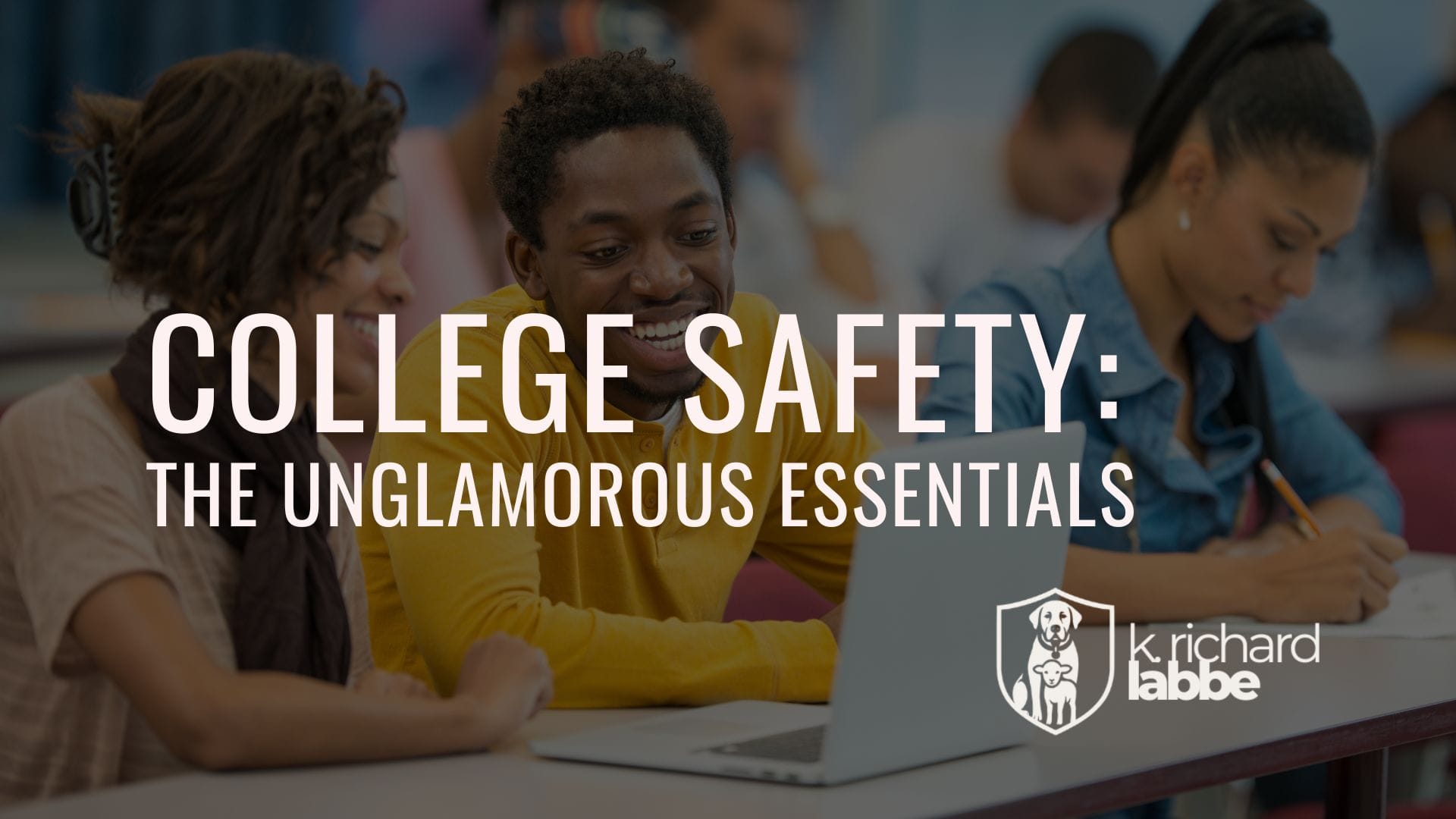College Safety: The Unglamorous Essentials
College is coming. Are you prepared?

Everyone's talking about your major, your meal plan, your roommate situation. Fair enough—those things matter. But there's something else that deserves a spot in those conversations: how to handle the very real risks that come with this new independence.
This isn't helicopter parenting or scare tactics. It's practical stuff that can save you headaches, money, and worse down the road. Think of it as part of your real-world education.
Digital Security: Because Scammers Love College Students
Here's the unfortunate truth: you're now a prime target. College students manage tons of accounts, use networks they don't control, and are often distracted or stressed. Scammers know this.
The password situation alone is enough to make anyone's head spin. School portal, email, banking, cloud storage, streaming services—it adds up fast. Using the same password everywhere is tempting but dangerous. A password manager handles this problem elegantly. We recommend NordPass, though any reputable service works.
Two-factor authentication sounds like a pain until someone tries to break into your email at 2 AM. Turn it on for anything that matters—banking, email, school accounts.
Your devices need attention too. Set them to lock automatically, use biometric access when available, and treat them like you would your wallet. That means never leaving them unattended, even briefly. In shared spaces, a privacy screen for your laptop isn't paranoia—it's common sense.
Those urgent emails claiming to be from campus IT or financial aid? Almost always fake. Real campus offices don't ask for passwords via email. When something feels off, call the office directly using a number from their official website.
Watch out for "academic help" sites that offer to take your quizzes or write your papers. Beyond the obvious ethical problems, many are fronts for identity theft.
Your Living Space: Simple Precautions That Actually Work
Whether you're in a dorm or your first apartment, a few basic security measures make a real difference.
A portable door lock or wedge alarm adds protection without requiring permission from housing. Store important documents in a small lockbox—not necessarily fireproof or fancy, just secure. Keep valuables out of plain sight.
If you're off-campus, test your window locks and consider renter's insurance. It's cheap and covers more than you'd expect.
Talk boundaries with roommates early. What's shared, what's private, what are the guest policies? These conversations feel awkward initially but prevent much bigger problems later.
Travel: Getting Around Safely
Half-empty gas tanks and dead phone batteries have stranded more students than anyone likes to admit. Keep your tank above half-full and carry a portable charger.
An emergency kit sounds excessive until you need jumper cables at midnight. Include a flashlight, basic tools, snacks, water, and a blanket. Store it all in a bag so it's easy to move between vehicles.
Never leave electronics or backpacks visible in your car. "Just for five minutes" is how most break-ins happen.
For rideshares, match the license plate and driver name before getting in. For late-night walks, one earbud in, not both. Tell someone your plans when you're heading somewhere unfamiliar or after dark.
Health and Emergency Prep
Set up your phone's emergency features now, while you're thinking about it. Add ICE (In Case of Emergency) contacts and fill out the medical ID section. Locate your campus health center and know where the nearest urgent care or 24-hour pharmacy is.
Carry a basic first aid kit and any medications you take regularly. These seem unnecessary until they're desperately needed.
College brings stress and anxiety for many people. Know your limits and build sustainable habits—sleep, exercise, time outdoors, genuine friendships. As Proverbs 4:23 puts it: "Above all else, guard your heart, for everything you do flows from it."
Online Learning: Structure When Home Is School
If you're studying from home, you need both structure and backup plans.
Protect your equipment with a surge protector or battery backup. Back up important files regularly—cloud storage or an external drive, doesn't matter which as long as you actually do it.
Create a dedicated workspace if possible, and establish clear boundaries about when you're "in class." This helps both your focus and your family's understanding of your schedule.
Have a plan for internet outages. Know where you can go—library, coffee shop, friend's house—if your connection fails during an important class or exam.
Money and Identity Protection
Financial scams targeting students are everywhere, and they're getting more sophisticated.
Never pay upfront for jobs, housing, or financial aid opportunities. Legitimate offers don't require payment from you. Don't give out passwords or personal information in response to unsolicited requests, no matter how official they look.
Monitor your bank and credit accounts regularly. Set up alerts for transactions over a certain amount. Use credit cards instead of debit cards when possible—they offer better fraud protection.
Don't store sensitive information like Social Security numbers on unsecured devices or in easily accessible files.
Staying Grounded in the Chaos
College stretches you in ways you're not expecting. The intellectual challenges are obvious, but the emotional and spiritual growth can be more intense than anyone prepares you for.
Take time to think about who you're becoming and what you want to shape you. Find people who remind you of your values—whether that's a campus ministry like Cru or Reformed University Fellowship, a local church, or mentors from home.
Keep some simple practices that center you. Prayer, journaling, Scripture reading—even a few minutes daily makes a difference when everything else feels chaotic.
Real safety isn't just about passwords and door locks. It's about staying connected to what grounds you.
For Parents: Supporting Without Smothering
Review emergency plans together, but don't micromanage the details. Make sure your student has insurance information, important phone numbers, and key documents.
If your student is over 18, discuss whether you need healthcare proxy or FERPA forms for emergencies.
Ask good questions and listen to the answers. Offer wisdom when asked, but leave room for them to figure things out. Trust that learning happens, even when it's messy.
Quick Action Items
Before classes start:
- Set up emergency contacts and medical ID on your phone
- Turn on two-factor authentication for important accounts
- Back up your files
- Pack an emergency kit (charger, flashlight, first aid basics)
- Identify what keeps you mentally and spiritually grounded
- Have one real conversation about emergency plans with someone you trust
Final Thoughts
This next chapter isn't just about grades and getting a degree. You're learning to live independently, make good decisions, and handle whatever comes your way.
You don't need to have everything figured out before you start. But having a plan—and people who care about you—makes all the difference.
Be smart, stay connected, and take care of yourself. You've got this.
